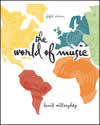Chapter 2 Vocabulary for Listening and Understanding: The Nature of Music What is music? For discussion, Chapter 2 offers optional definitions of music. Terms and concepts presented relate to the physical aspects of sound and of music, music’s expressive and functional qualities, and how people participate in it by creating, performing, and listening. This chapter seeks to provide a clear answer to the question, "What is music?" Definitions of Music—music escapes easy definition. Physical Characteristics - Music as a science—acoustics, the physical basis of music. Construction of musical instruments. Audio equipment. Construction of auditoriums and recording studios. Construction of homes and offices.
- Music as sound and silence.
- Music moves through time—to remember and to anticipate. Forward energy—progression, momentum.
Expressive and Functional Qualities - Music as an art—high art, a cultivated tradition, and folk art, a tradition accepted by the masses or the majority of people within a cultural or sub-cultural group.
- Music as a universal phenomenon.
- Music as a means of expression. Communicates feelings and images. Generates both universal and culture-specific aesthetic responses.
- Music as a psychological phenomenon—the potential to affect and change people’s feelings, attitudes, and behaviors. Music therapy. Environmental music.
- Music changes. Societies change; tastes and values change. New or refined sound-producing sources (instruments). Experimentation and finding new ways of creating music.
Music as a Process - Participation in music—as creators, performers, and listeners.
|



 2003 McGraw-Hill Higher Education
2003 McGraw-Hill Higher Education